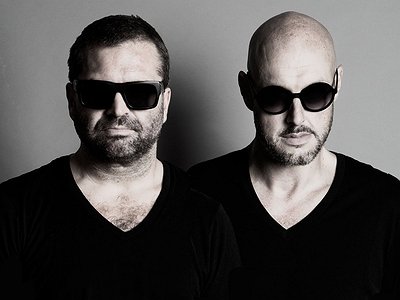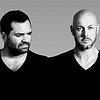Part 1
Name: Dan Duncan & Igor Tchkotoua
Nationality: British, Spanish
Occupation: DJs / Producers
Labels: Bedrock, Cocoon, Soma
Current Release: Modular Baptism on Elevate.
Musical Recommendations: Remy Unger, Vinicious Honorio
If you enjoyed this interview with Pig&Dan and would like to find out more about their music and recent tour dates, visit their official homepage. They are also on Instagram, Facebook, and Soundcloud.
To keep reading, check out our 2023 conversations with the duo about REAKTOR and about technology and creativity.
Over the course of their career, Pig&Dan have remixed, been remixed by, and collaborated with a wide range of artists. To keep reading check out our conversations with some of them:
[Read our Gregor Tresher interview]
[Read our Victor Ruiz interview]
[Read our interview with Victor Ruiz about DJing]
[Read our David Morales interview]
[Read our Tiger Stripes interview]
[Read our John Digweed interview]
[Read our Inner City interview]
[Read our Kevin Saunderson interview]
[Read our Andres Campo interview]
When did you start DJing - and what or who were your early passions and influences?
We both started really early at 17 years young. However, when I reached the age of 19 and started to take things a bit seriously, my main influences were artists like Slam and Joey Beltram, both of which were churning out incredible anthems that remained underground. Mainstream artists such as Snap! were of course rubbing off on entire industry because of their crossover styles.
This is what led me and others to experiment by adding break beats over house music at a tempo of around 132 BPM. This in turn, sparked the start of the Drum&Bass movement, and when myself and fellow group members of my old group INTENSE began, there really was only about 30 artists producing with this sort of sound.
One of the fondest memories back in those days, was that vinyls were very much distributed on a local level, so it was super exciting going to other record shops in other countries and source music nobody else had. Those days have long surpassed us thanks to the digital era sadly …
For most artists, originality is first preceded by a phase of learning and, often, emulating others. What was this like for you? How would you describe your own development as an artist and the transition towards your own style?
Well this might sound kind of strange, but as Pig&Dan started on the island of Mallorca. We were kind of segregated from all the worlds trends that influenced a lot of artists that were based in cosmopolitan cities. We just selfishly created what we wanted to play out in our sets from the very beginning.
We of course studied how artists we respected arranged their tracks. But still to this day we remain faithful to ourselves and try to do what we feel is right.
What were some of the main challenges when starting out as a DJ and how have they changed over time? What is it about DJing, compared to, say, producing your own music, that makes it interesting for you?
Well I think of course standing out as a DJ has got even harder since pretty much anyone can have the same music in their set these days.
With the online world being so saturated, we’ve heard DJs perform very similar sets because they’re playing what’s hot at that moment on online portals. I think many DJs find it hard to remain true to themselves and push their individual style. This is why we always play our own music in our sets. People may like it or not but one things for sure it will be unique.
Technology of course has totally changed as well, and recently we’ve arrived at gigs where they don’t even have monitors for the DJ because they’ve only had DJs playing with computers and sync. This for us is rather unbelievable, as we love the sexiness of human error and movement and truly feel it adds a lot of soul to a performance. Computers can be a tad linear when it’s all perfect.
The real interesting part of being a DJ is about giving people time out form their everyday crap. And our advantage is that playing our own productions is such a high if people react positively to it.
What was your first set-up as DJ like? How has your set-up evolved over the years and what are currently some of the most important pieces of gear for you?
My first set up was two Techniques 1200 Record players and a Vestex mixer I believe. Now it’s all about CDJ-2000s and I do love them because the sound they emit is simply massive …
Also these days we always use the Allen & Heath Xone 92 because nothing compares to having a 4 band EQ and that warmth.
How do you see the relationship between the tools you're using and the creative results – in which way do certain tools suggest certain approaches, in which way do they limit and/or expand your own creativity? Do you believe in the idea of progress in DJing from a technological perspective?
Actually although I respect those who use those tools in a different form, it's not really the same process at all. We mix together productions that compliment each other, however they’re complete and have effects in them. We like to show off what producers do with their own creations.
We don’t play linear music where you need to add reverbs and echo effects or loop them to add other pieces of tracks or stems on top. Everyone has his or her style but ours is somewhat more traditional.
Could you take me through the process of preparing for one of your gigs, please? How do you select the tracks you like to play, how do you prepare and how do you decide on the opening phase of your set?
It’s all spare of the moment ... Don’t prepare anything at all. You have to feel what the people need and where to go with them.
Every single place is very different and you need to be versatile.
What constitutes great mixing from your point of view? What are some of the sets that have personally impressed you over the years?
A good mix isn’t just about how long you can hold two tracks together, it's also very much about where you're going musically. DJing is very much psychological and is all about reading what the people need to hear to take them to the place where they want be. That one decision can totally change the form of the experience. It is our responsibility to make the right move and that’s what a good mix really is.
For us Sven Väth is the absolute master at creating that musical trip. Sven is for sure our mentor, he masters being able to play such a wide variety of styles while keeping that euphoric line all the way throughout. We love dynamic sets and that’s very much we are all about because any form of music can be incredibly boring if you always stick to the same line …
We are part of the anti-yawn generation. (laughs)
You've mentioned in a previous interview that you feel the art of DJing is slowly dying. What, exactly, constitutes this art of DJing to you? Are there perhaps approaches using contemporary tools that you also feel deserve to be labelled 'artful'?
Well if you look at the main stage at many festivals you'll see most DJs not even have headphones with them because theyre playing a prerecorded set. That's a pretty clear indication that its becoming more about the entertainer than the DJ in the mainstream.
Although this is watering down the so-called DJ technique I do feel there's a positive side to it as well. This in turn is openning up the world to be more open minded about listening to dancemusic on the whole.
You've stated that one of the disadvantages of sync buttons and laptop DJing is the loss of 'sexy little slips' in the flow of the music. In how far does this preference for subtle errors also apply to your album productions in general – and to the production of Modular Baptism in particular?
This album was all about hands on, there's buckets of spare of the moment things going down right the way through. I think in the creative process error often ends up as something very attractive to the ear. It's got life and holds something more organic. This often can be lost in the electronic computing realm.
One of the most striking features of any Pig&Dan piece, at least to me, is the precise and powerful percussion production and the way it slots in with the bass – many of the tracks could easily work with just these two parts running. Can you take me through how you program and sculpt the drums and some of your favourite sound sources, please?
First off thanks for the kind words! We always try to create things from scratch. As we use Logic X as our DAW we are not tempted to use loops in our productions. We like to create them and build them around each other in such a way that it not only works musically, but they also compliments each other on a sonic level.
When I worked in pop music as a sound engineer I learned that everything has to have its place sonically. We like to keep that rule and try to make sure that you can pick anything out of the mix that gets you locked into it.
Of course the most important thing for us is the BASS. We love it, and we live for it, so that has to be the cradle that nurtures the rest of the composition.
We make sure that the kick and bass don't conflict by checking the frequencies don't clash and also try to compensate by using a sidechain on the bass from the kick.






